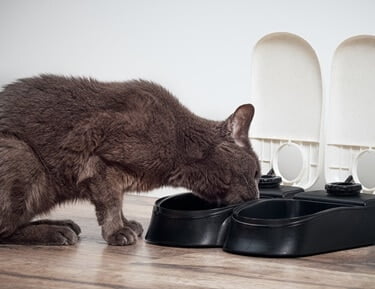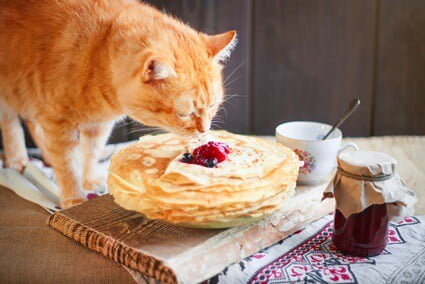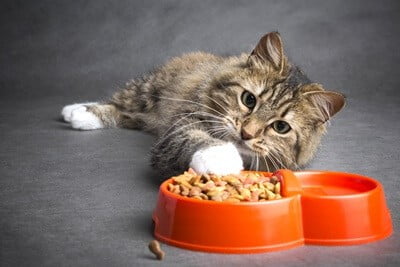The inclusion of carbs in cat food is controversial. While some people see them as a good source of energy, others believe that carbohydrates are responsible for the rise in feline obesity and diabetes. Nevertheless, both sides would agree that cats digest carbohydrates less efficiently than other animals.
Cats evolved on a carnivorous (meat-based) diet, so most of their digestive enzymes are geared toward digesting protein rather than carbohydrates. However, cats can tolerate some forms of carbs better than others. Most cats can digest cooked starches but not sucrose.
Although you should avoid high-carbohydrate cat foods, you shouldn’t eliminate carbs from your cat’s diet altogether. Carbs may have some health benefits, and even wild cats consume them in small amounts. So, if you want to monitor or reduce your cat’s intake of carbohydrates, we’ll show you how to achieve this goal safely.
Issues with Feeding Cats Carbs
To understand why there’s so much controversy surrounding this issue, here are some of the problems with feeding your cat carbohydrates:
Reduces Protein Consumption
Carbohydrates are often used to bulk out cat foods, particularly kibble.
Although legislation is in place to ensure that the protein content of cat food doesn’t fall below 25%, domestic cats still consume less protein (and relatively more carbohydrates) than cats living in the wild.
Some research even suggests that a high-carb diet may interfere with the absorption of protein.
Diarrhea, Vomiting, Bloating, and Flatulence
Certain types of carbs are almost impossible for a cat to digest. Other types of carbohydrates are easier on the cat’s stomach, but they still might cause mild symptoms, such as flatulence and bloating.
Cause of Diabetes Mellitus
Carb-rich cat food has been blamed for the rise in feline diabetes.
May Lead to Obesity
Domestic cats eat more carbohydrates than wild cats. This is compounded by the fact that many domestic cats are inactive, so they don’t burn off the excess calories.
According to AAFCO, cat food is allowed to contain up to 55% carbohydrates. If carbs are responsible for certain health problems, it’s easy to see why owners would be concerned about feeding their cats conventional cat food.
Do Cats Need Carbohydrates in Their Diet?
Given the problems associated with carbohydrates, you might wonder if they hold any nutritional value for cats. According to nutritional guidelines, there are no minimum carbohydrate requirements for cats. Cats have evolved on a high-protein diet, so they’ve learned to create energy from the amino acids in animal flesh.
Cats living in the wild consume small amounts of carbohydrates. For example, cats consume small amounts of vegetation. Also, their prey (i.e., mice) have a small amount of carbs in their stomachs. Prey animals contain between 1 and 8% carbohydrate, so even the wildest of cats will consume some carbs.
According to the Pet Food Manufacturing Association, carbs can aid digestion if added to pet food in moderation. For example, certain complex carbs are high in fiber (beet pulp) and can help keep the cat’s digestive system running optimally. Moreover, when a cat is pregnant, she benefits from a relatively high-carbohydrate diet as protein cannot be absorbed as efficiently.
So, while cats don’t need carbohydrates to thrive, especially in comparison to dogs or humans, it is natural for them to consume small amounts of carbs. It would be inappropriate to eliminate this macronutrient completely.
Can Cats Digest Carbohydrates?
It’s too simplistic to say that cats can’t digest carbohydrates. It is more accurate to say that cats digest carbs less efficiently than other animals because they only have small amounts of the digestive enzymes required for digesting carbs. For example:
- Cats have low levels of amylase in their pancreas. Amylase helps to break down carbs.
- A cat’s pancreatic tissue has low maltase activity. Maltase helps to break down maltose into glucose (sugar).
- There is little lactase or sucrase activity in the pancreatic tissue. Lactase is the enzyme required to process lactose (found in cow’s milk), and sucrase is the enzyme that processes sucrose.
- Maltase, Isomaltose, and sucrase enzymes are present in the small intestine, but activity is low.
As you can see, cats are not incapable of digesting carbs, but they’re not efficient at doing so. At least two factors determine how efficiently the cat will be able to digest carbohydrates. These factors include the:
- Type of carbohydrate
- Portion size
Which Carbohydrates Are Bad for Cats?
There are many different types of carbs, and some are difficult for cats to digest. For example, there is strong evidence to suggest that cats cannot tolerate sucrose.
The enzyme sucrase breaks down sucrose. Cats have sucrase enzymes in their small intestine, but the activity level is low, so they will struggle to break down sucrose. Some cats respond badly to minuscule amounts of sucrose, whereas other cats can tolerate slightly larger amounts.
Research shows that if cats consume more than 7g of glucose per kg of body weight (or if more than 36% of the meal contains sucrose), the adverse effects are likely to be significant. These side effects include bloating, flatulence, lethargy, and diarrhea, potentially leading to dehydration.
Thankfully, sucrose is not added to cat food in any significant amount. The type of carbohydrate used in conventional cat food is easier for cats to digest. Cats do occasionally overeat sucrose if they get their paws on leftovers or sweet treats, such as:
- Chocolate
- Oriental sweet sauces and some pasta sauces
- Cake crumbs
- Flavored drinks
Best Carbohydrates for Cats to Digest
Most cats can tolerate starches (polysaccharides) well. Starches are complex carbs, so they may be digested in a different way to simple sugars. According to NCBI, the following starches (cooked) are digested well in cats:
- Cassava flour
- Brewer’s rice
- Corn
- Sorghum
- Pea
- Lentil
The brewer’s rice was digested most effectively, but the digestibility was above 93% for all of the above starches. Indeed, most carbs added to conventional cat food are starch.
In the above study, starch accounted for 35% of the cat’s entire meal. To promote a healthy diet, the starch must be balanced with other macronutrients, such as protein and fat.

How Much Carbohydrate Can Cats Digest?
Most cats can digest starches as long as they are consumed in moderation. If too much carbohydrate is consumed, it may pass through the small intestine (undigested) and into the colon, where it will ferment. If carbs are left to ferment in the colon, this will alter the microbial environment and may lead to symptoms such as:
- Diarrhea
- Flatulence
- Bloating
- Bacterial overgrowth leading to more severe illness
How much carbohydrate is tolerable for a cat? There’s no clear consensus. In the US, the Association of American Feed Control Officials requires the carbohydrate content of cat food to be no more than 55%, 25% protein, and 20% fat.
If you shop around, you’ll see that some cat foods contain quite a lot less than 55% carbohydrate. Research suggests that a better range would probably be between 15% and 35% carbs. This would better mimic a cat’s natural diet while still allowing manufacturers and owners to benefit from the practical aspects of using carbs in cat food.
How to Check the Carb Content of Cat Food
Unfortunately, pet food manufacturers rarely list the carbohydrate content of their products. It is a legal requirement for pet food manufacturers to declare the percentage of crude:
- Protein (minimum)
- Fat (minimum)
- Fiber (maximum)
- Moisture (maximum)
A measure for ash is usually also provided, though it is not a requirement. If it is not provided, you can estimate it as 3%. If you add up the above percentages and subtract from 100, the result gives you a rough estimate of your cat’s food’s carb content.
You cannot compare the carbohydrate content of wet food with dry food using this calculation due to moisture content differences. Nevertheless, it’s true that dry food almost always has a higher carb content than wet food.
The average kibble contains around 30-40% starch, whereas the average wet food contains 1-7% starch. This is because more starches are required in the production of kibble.
A small amount of carbohydrate is used to produce wet food, for example: to thicken the gravy, add a caramel color, or set the food into a loaf shape, but much more is required when producing kibble. If you’re concerned about the carb content of your cat’s meals, the easiest thing to do is cut down on kibble.
Does Grazing Help Cats Digest Carbs?
Cats can digest cooked starches well, even though they’ve evolved on a meat-based diet. Some scientists believe this is because cats eat little and often. Cats only have small amounts of digestive enzymes, such as amylase, but this doesn’t matter if their portion sizes are small.
When given a choice, cats eat little and often throughout the day, giving the body time to digest a meal. This may explain how they’ve adapted their digestive system to a higher-carb diet. So, if you allow your cat to graze on 4-8 small meals per day, rather than one or two larger ones, they may be able to digest and metabolize carbs more comfortably.
Is My Cat Allergic to Carbohydrates?
Although most cats can digest starches (cooked), a small number may be intolerant or allergic to certain cereals, grains, or vegetables. Symptoms include:
- Vomiting
- Diarrhea
- Inflamed or itchy skin
- Runny eyes
- Wheezing / difficulty breathing
Switching to a hypoallergic cat food often helps as these foods do not include common carbohydrate allergens, such as corn. In some cases, food allergies are to blame for Inflammatory Bowel Disease (IBD). If a new, more appropriate diet is found, this can clear up the IBD. Nevertheless, IBD can be caused by different factors, so changing a cat’s diet isn’t always beneficial.
Do Carbohydrates Cause Diabetes in Cats?
Diabetes mellitus is one of the most common metabolic disorders in cats. Some scientists believe that carbs are directly responsible for causing diabetes. According to this theory, carbs spike the cat’s blood sugar, and it takes a long time to clear sugar from the blood because cats lack the hepatic enzymes required to process glucose effectively.
This puts pressure on the pancreas to keep producing enough insulin to cope with high sugar levels in the blood. Over time, this leads to insulin resistance and type 2 diabetes. However, this is a hypothesis, and there are few clinical studies to support this theory. Most vets and specialists agree that there is insufficient evidence to show that eating carbs lead to diabetes.
Nevertheless, it is widely accepted that high-carb foods may play an indirect role in causing diabetes because eating carb-rich foods can lead to obesity. Additional risk factors include:
- Age – 10+ years
- Sex – male cats are more at risk
- De-sexed cats – cats who are neutered/spayed
- Corticosteroid/progestins
- Inactivity/confinement
- Genetic – a predisposition in Burmese cats
While there is no clear evidence to suggest that carbs directly cause diabetes, a low-carb diet may help manage diabetes because it should assist with weight management.
Do Carbohydrates Cause Obesity in Cats?
Feline obesity is on the rise, according to many vets. It seems likely that carb-rich kibble cat foods are partially to blame. However, other factors may also play a role:
- Fat Content – The relatively high-fat content of some cat foods, sometimes up to 45%.
- Palatability – The palatability of foods has improved in recent years, making cats more likely to overeat.
- Grazing – Allowing a cat to graze on food throughout the day is a good thing because it recreates their natural feeding behavior. However, your cat might start overeating.
- Inactivity – A cat in the wild would catch up to 9 small meals in 24 hours but burn calories while hunting these meals. Cats that spend all their time indoors will consume a similar number of calories but burn off fewer.
While cutting down on carbohydrate-rich foods may reduce the incidence of feline obesity, it’s also important to consider how often you’re feeding your cat and whether you’re meeting their physical and emotional needs.
Are Alternative Cat Foods Better?
If conventional cat foods contain up to 55% carbohydrate, might it be better to consider alternative cat foods? In recent years, the trend for raw, organic, and meat-based cat foods has grown.
These alternative cat foods contain only small amounts of vegetables or cereals. The problem is, they can cost 4 or 5 times the price per portion. So, are alternative cat foods better for your cat?
There has been no long-term, large-scale studies to test the benefits of raw, meat-based diets for domestic cats. Common sense tells us that these diets are quite beneficial, especially for weight management. However, feeding your cat a raw food diet might increase their risk of contracting a bacterial infection.
If you want to control the number of carbs your cat consumes, but you don’t want the expense of alternative cat food, there are some other ways you can reduce carbs in their diet.

How to Manage Carbohydrates in a Cat’s Diet
Carbohydrates are not toxic or dangerous for cats, but they should be consumed in moderation. To ensure your cat is consuming a healthy amount of carbs, consider the following:
Check Labels
Although there is no legal requirement to print the carbohydrate content on cat food labels, you can work out a rough estimate. For kibble, select a product that contains less than 30% carbohydrate.
Wet Food
If your cat eats a lot of dry food, try substituting some of it for wet food, as wet food contains less starch. If you increase wet food and decrease kibble, make sure you are feeding them the right number of calories over the course of the day. An overweight domestic cat requires around 240 kcals a day, and a lean cat requires around 280 kcals.
Do Not Feed Leftovers
Do not give your cat leftovers or treats as these may contain sucrose, which is indigestible for cats. This includes sweet treats like cakes and cookies, but also pasta and meat sauces.
Fiber
Cat foods containing fibrous starch, such as beet pulp, can be beneficial for your cat’s digestive system.
Pregnancy
If you’re caring for a pregnant cat, she’ll need to consume more calories per day (up to 800 kcal). Feeding her a cat food that’s relatively high in carbs (i.e., 30-45%) may be a good way of satisfying her energy requirements. Also, there is some evidence to suggest that carbs may be particularly beneficial for felines during pregnancy.
Carbohydrate Allergies
If your cat has chronic bloating, diarrhea, or vomiting after eating conventional cat food, it may be intolerant or allergic to one of the ingredients. Cats are more likely to have an allergy to carbs than meats. If you see these symptoms, take your cat to the vet for an examination. Your vet may recommend a hypoallergenic cat food.
Consider Alternative Cat Food
You could consider feeding your cat a raw or organic meat-based diet. These diets mimic the diet your cat would eat in the wild. There are no long-term studies to back up the efficacy of these diets.
Allow Your Cat to Graze
As discussed, cats can digest starches more effectively if they consume them in small amounts. If possible, feed your cat 4–8 small meals per day rather than 1-2 larger meals.
However, only put 1 small portion down at a time. If you are out of the house for most of the day, consider getting a cat food dispenser. Keep a tally of the total calorie content of all the meals to avoid overfeeding your cat.
Although carbohydrates can be difficult to digest, they still have a small place in the cat’s diet. While carbohydrates have been linked to conditions, such as obesity and diabetes, other factors play a role in these conditions, such as overfeeding and physical inactivity.
If you want to improve the health of cats, you must attend to their overall needs. This includes playing with cats regularly, offering appropriate portion sizes, and monitoring their carbohydrate consumption.

